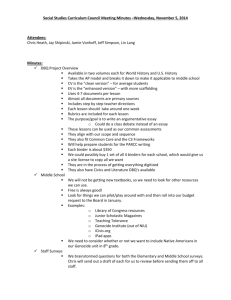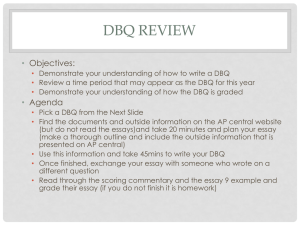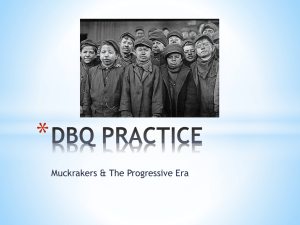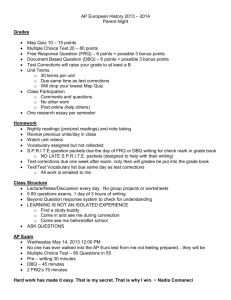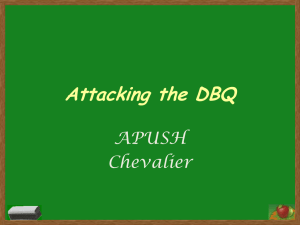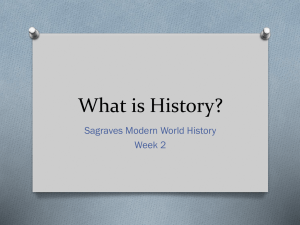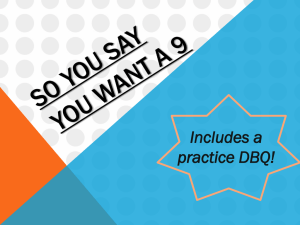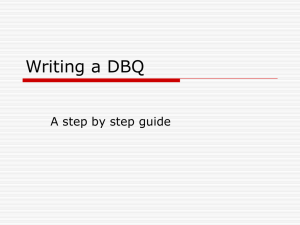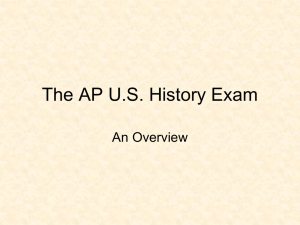DO`S AND DONT`S OF THE APUSH EXAM
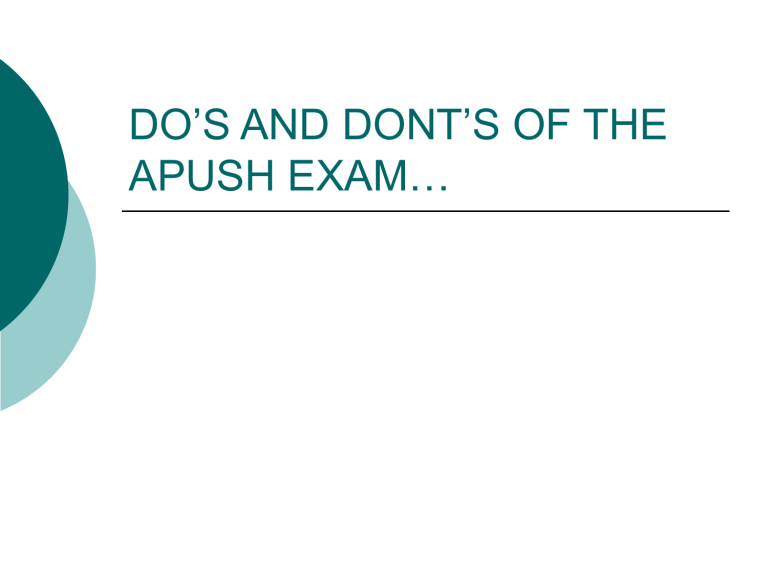
DO’S AND DONT’S OF THE
APUSH EXAM…
DO…
GET PLENTY OF SLEEP THE NIGHT BEFORE
EAT A GOOD BREAKFAST
HAVE A SNACK BETWEEN SECTIONS OF THE
TEST
USE A BLUE OR BLACK PEN—BRING SEVERAL
BRING PLENTY OF SHARPENED PENCILS FOR THE
MC PORTION OF THE TEST
BRING A BOTTLE OF WATER…KEEP HYDRATED
FOR YOUR BRAIN!
BRING A WATCH—MAKE GOOD USE OF YOUR
TIME
STRATEGIZE 1 ST —IT WILL SAVE YOU TIME IF YOU
PLAN AND CREATE A SHORT OUTLINE FIRST
DON’T…In General
Make little doodles/pictures/scribbles on your paper—looks like you didn’t even try (therefore…why should the person grading your test give you
ANY benefit of the doubt)
Do not use abbrevations or “text slang”
Do not use familiar terms i.e.
Tommy J, Teddy or T.R., George etc…
What do the numbers mean?
5= extremely well qualified. Highest possible grade
4= well qualified.
3= qualified.
2= possibly qualified.
1= no qualified to receive college credit.
Level of college credit awarded will vary from college to college—some may exempt you from taking the class, while others may not only exempt you, but give you credit for the class as well.
Multiple Choice…
80 questions-each with 5 possible answers
55 minutes to complete—that’s about 68 seconds per question…
Read through the question AND answers before selecting an answer—make certain you know what the question is asking before you answer
Historical Eras covered
1/6 of the questions deal with events from 1600-1789
½ of the questions deal with events from 1790-1914
1/3 of the questions deal with events from 1914 to present day
YES…the AP exam can ask MC questions up to present day!
MC Topics…
37% of the questions deal with political institutions and public policy
36% of the questions deal with social change
13% of the questions deal with diplomacy and international relations
8 % of the questions deal with economic changes and developments
4% of the questions deal with cultural and intellectual developments
Don’t stress out! You’ve had ALLLLLLL of these style questions on all of your tests all year long!!!!
How is it graded? (MC)
80 questions (answered all)
60 correct (raw score)
20 incorrect
# correct (raw score) - ¼ * # incorrect = scaled score
60- ¼ * 20 = 60-5=55 (scaled score)
57 and above = 5
41-56
31-40
= 4
= 3
Should I guess???? (On the APUSH exam…not class tests—class tests should be completed)
If you don’t have a clue---DON’T GUESS!
If you can narrow it down to 1 or 2 answers—
YES…GUESS
Go with your first gut instinct—it’s usually right and honestly you don’t have the time to debate every single question
Do not leave more than 8-10 questions blank
MC is easiest in the beginning and harder as the test progresses
You will probably see political cartoons on the test
DBQ…
OK…SO HERE’S THE DEAL…THE
AVERAGE SCORE ON THE DBQ FOR
2007 WAS 3.4—YOU GUYS ARE NOT
AVERAGE!!!!!!!!!
DBQ…
You will have a mandatory 15 minutes to review the documents prior to writing the
DBQ—make an outline
Then you will have 45 minutes to write the DBQ
Think about it—I’ve given you 25 minutes from start to finish the review and write the DBQ—15 minutes to review is a GIFT
You can write on the DBQ—use this opportunity to make notes and highlight
(***) key pieces of information to help you with your essay
DBQ…
Incorporate as many documents as possible into your essay
Do not use long or frequent quotes—best not to quote at all
ANSWER THE QUESTION…focus on your essay—the documents are merely supporting your thoughts and ideas—not the other way around
Cite the documents (Document A)
Do NOT write your essay in order of the documents—no laundry lists of
Documents
DBQ…
Do NOT NOT NOT (did I say NOT already????) state the following in your essay
Document B says----
AHHHHHHHHHHH!!!!!! We don’t live at
Hogwarts—and there are no Howlers except for me if I get your paper back and you have written this…I WILL hunt you down like a dog in the Junior halls next year…
FRQ’s…
2 FRQ’s
70 MINUTES FOR BOTH—
APPROXIMATELY 35 MIN. EACH TO
ANSWER
CHOOSE 1 OF 2 OPTIONS ON A
QUESTION PRIOR TO THE CIVIL
WAR AND CHOOSE 1 OF 2 OPTIONS
ON A QUESTION AFTER THE CIVIL
WAR
Possible topics…on both DBQ & FRQ’s
Change over time
Cause and effect
Compare and contrast
Define and Identify—not an essay itself, but may be necessary to answer the essay
Statement and Reaction
Evaluation
Analyzing viewpoints (Do you agree with this statement—is this a valid point of view)
On both DBQ’s and FRQ’s…
Do not use “weak” words
For example: do not use “Says” “Tells” “Speaks of” “Firstly”
“Secondly”
Instead use action words: the author contends, portrays, presents, argues, illustrates,
Do not UNDER ANY CIRCUMSTANCES state the following in your papers---This topic is alike yet different—It is the kiss of death!
Do not ask a question—you have the answers—let the reader know it
Have a kick…….thesis statement—once you grab them they will spend more time on your paper
Don’t ramble---be consistent & use transitional sentences/ phrases
For example: On the otherhand, From a different perspective,
Likewise,
ALWAYS keep your paper in the 1 st person—do not use “you” or “we”
For example: “it can be implied” or “one can deduct from this line of reasoning that ….”
